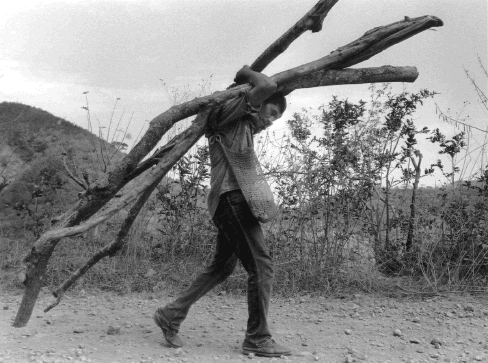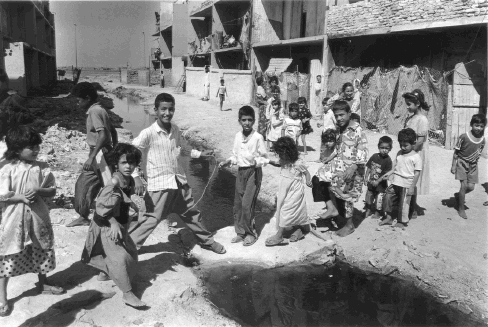|
Children of Abraham: Faces of the Middle East |
 |
|
by Grace McEvoy
A look at a list of the things Alan Pogue has chosen to photograph over the years could leave the impression that he is a man who goes looking for the worst humanity has to offer. However, don't let subject matter such as farm workers, post war El Salvador, prison conditions, colonias along the south Texas boarder, and most recently, conditions in Iraq as a result of United Nations sanctions against the country, allow you to misunderstand why Pogue photographs them. It is not a desire to reveal the evil underbelly of humanity but a belief in the essential goodness of human kind and a view that even the hardest heart can grow to regret heinous acts. It is in the act of rationalizing things such as hate, domination and abuse that humanity reveals its basic goodness according to Pogue, otherwise there would be no need to explain the behavior and thus "people can not be essentially evil." "The hardest part is not to count anyone out...everyone who hates surly has a good reason. You can't give up on anybody. Everyone is reachable because of their essential goodness."
Children of Abraham: Faces of the Middle East is currently on view at Pogue's Texas Center for Documentary Photography at 2104 East Martin Luther King, Jr. Boulevard. The photographs are the result of a trip Pogue made in July to Iraq and the West Bank as part of the Voices in the Wilderness delegation. One image that stands out is a portrait of a woman that Pogue calls "The Sad Woman of Basrah." It is a straightforward and beautiful image of a woman covered in Arab garb who is simply looking into the camera yet is so clearly deeply in despair. Another stunning portrait is of a man in Hebron who has just received a home demolition order from the Israeli military. To make such beautiful images in the midst of chaos and despair mark Pogue as an intuitive and seasoned photographer. Several photographs were taken at a housing complex for displaced persons. The photographs are a clear and shocking record of a complex which was never completely constructed, housing 8,500 people with no plumbing. The images in the exhibition come together to tell a more complete story than we get through our television and print media. There is a photograph of the inside of a bombed building, of a street scene with balconies that look like New Orleans, of a sick and dying little girl without access to medicine , of protesting mothers and of well armed Israeli soldiers hanging out in the street.
U.N. sanctions in Iraq have created a critical need for medicine in that country and in protest of the sanctions, the Voices in the Wilderness delegation tried to address that need. Pogue's roll to visually document the situation where over 4,500 children a month die due to conditions and lack of supplies, is one that his 30 years as a documentary photographer of conscience, integrity and visual sense make him well suited.
It is a role he takes very seriously as an advocate and practitioner of a tradition of documentary photography that is seldom seen, despite the abundance of images we consume today. Many of these images Pogue likes to call "commercial Journalism." They are made with the goal to shock, stun or startle the viewer and have an immediate impact as a commodity but they lack lasting value. "In the future, no one will care about advertising photographs." To Pogue the documentary photographer must "be willing to photograph what might be mundane" and do nothing to disturb the subject. Those mundane photographs are the ones that researchers, historians and the curious will seek out to see what life was really like. "It is deceptively simple. You want to photograph what is happening. The trick is to know what is important right now. It's not about changing things to make them more interesting. A documentary photograph would be one that changes things not at all."
Not simply interested in documenting disaster, Pogue seeks situations based upon his interest in groups of people who are targeted for abuse. "I am interested in disasters of the human sort which are engineered by governments. They fall specifically on targeted groups. It seems to me that farm workers are one of those targeted groups...they are intentionally harmed by people who profit from them. This is not a hurricane."
Aside from being a work and gallery space, the Texas Center for Documentary Photography is a way in which Pogue can pass along the art and craft of his work as a teacher of sorts. He would like to attract younger photographers who are just starting out and who are interested in learning about documentary photography in exchange for some work. Two such students helped with the production of the current exhibit. Pogue would like to carry on and pass along a tradition of documentary photography that involves telling the truth in the same vein as the late Russell Lee a former Austinite and famed photographer of the Farm Security Administration.
A great challenge to carrying on this tradition is that it has no commercial appeal and photographers must find funding sources. Through the American Friends Service Committee, many people got together on the funding to send Pogue to Iraq. He recently received funding from the Kellogg Foundation to continue his work photographing the colonias along the south Texas Boarder where laborers work long hours in factories and live in shanty towns without basics such as plumbing. Recently he was asked by CURE (Citizens United for the Rehabilitation of Errants) to photograph prison conditions in 20 states and will work on that project over the next year and a half or two.
Alan Pogue's photographs of Iraq and the West Bank can be seen at the Texas Center for Documentary Photography and he will be showing them in several places in Houston including the University of Houston and the First Congregation Church.
|
||
top | this issue | ADA home |
||

